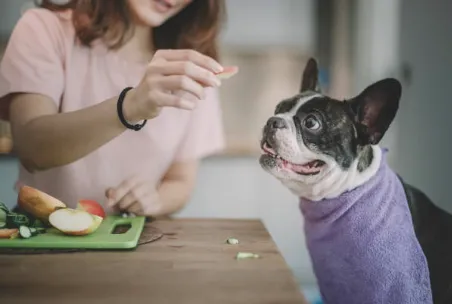Providing your canine companion with nutritious and enjoyable snacks is a wonderful way to boost their health and strengthen your bond. Many dog owners often wonder, “What Is A Good Snack For Dogs” that goes beyond commercial treats and offers genuine nutritional benefits. The good news is that a variety of human foods, especially certain fruits and vegetables, are not only safe but also incredibly healthy for your furry friend. By incorporating these natural options into their diet, you can enhance their well-being, provide essential vitamins, and even aid in training. This guide will explore some of the best human foods that make excellent, vet-approved snacks for dogs, along with important safety considerations.
The Benefits of Healthy Dog Snacks
Beyond just satisfying hunger, healthy dog snacks contribute significantly to your pet’s overall health. They can provide crucial vitamins and minerals, support digestion, and even help with dental hygiene. Choosing natural, whole-food options allows you to control ingredients and avoid unnecessary additives often found in processed commercial treats. These treats can also be a low-calorie alternative for dogs on a weight management plan or those with specific dietary needs. Maintaining your dog’s health often involves a balance of proper nutrition, regular exercise, and attentive care, including knowing how to treat a dog paw injury should minor mishaps occur.
Vet-Approved Fruits for Your Canine Companion
Many fruits are packed with nutrients beneficial for dogs. Always remember to wash them thoroughly and remove any seeds, pits, or cores before serving.
Apples
Apples are a fantastic choice, rich in vitamins A and C, and a great source of fiber. They are low in protein and fat, making them particularly good for senior dogs or those needing to watch their weight. The crunchy texture can also aid in cleaning teeth. Remember to always remove the seeds and core, as apple seeds contain small amounts of cyanide.
Bananas
Dogs can enjoy bananas in moderation. While rich in potassium, vitamins, biotin, fiber, and copper, bananas are also high in sugar. Therefore, they should be offered as an occasional special treat rather than a daily staple. These nutrients are essential for active dogs, who might experience wear and tear, and understanding how to heal a dog’s split pad can be just as crucial as providing them with a balanced diet. A few slices or a small frozen piece can be a delightful and nutritious reward.
Blueberries
Often hailed as a superfood for both humans and pets, blueberries are bursting with antioxidants, vitamins, and fiber. Their small size makes them an ideal training treat, and they can be mixed with plain yogurt for an extra healthy snack. For dogs that enjoy exploring, small treats like blueberries are excellent motivators, and understanding how to treat a bruised dog paw ensures they stay happy and healthy during their adventures.
 Assortment of healthy fruits and vegetables for dogs including carrots, apples, blueberries, bananas, pumpkin, and cucumber
Assortment of healthy fruits and vegetables for dogs including carrots, apples, blueberries, bananas, pumpkin, and cucumber
Wholesome Vegetables Your Dog Will Love
Vegetables offer a wide range of benefits, from hydration to essential minerals.
Cucumbers
Cucumbers are an excellent snack, especially for dogs on a diet or needing extra hydration. They are very low in carbohydrates and fat, while providing vitamins K, C, and B1, along with potassium, copper, magnesium, and biotin. Sliced or frozen cucumber pieces can be a refreshing and enriching treat.
Pumpkin
Pure, canned pumpkin (not pumpkin pie filling) is incredibly healthy for dogs. It’s a rich source of antioxidants and can be very beneficial for dogs with an upset stomach or digestive issues. You can also roast and peel fresh pumpkin for a delicious, homemade treat. A strong immune system, supported by nutrient-rich foods like pumpkin, can also aid in recovery, such as when you need to know how to treat a cut on a dog’s leg.
Carrots
Yes, dogs can definitely eat carrots! These crunchy vegetables are a low-calorie snack high in fiber and beta-carotene, which is converted to Vitamin A. Carrots are excellent for helping dogs feel fuller, making them a great addition to weight loss plans. Their firm texture also provides a natural teeth-cleaning effect, contributing to dental health.
 A small Jack Russell dog sniffs a chopped carrot held by a person, with more chopped carrots on a kitchen counter in the background, illustrating a healthy dog snack
A small Jack Russell dog sniffs a chopped carrot held by a person, with more chopped carrots on a kitchen counter in the background, illustrating a healthy dog snack
Understanding Portion Sizes and Preparation
While these human foods are healthy, moderation is key. Snacks should only make up about 10% of your dog’s daily caloric intake to prevent nutritional imbalances or weight gain. Always introduce new foods slowly and in small quantities to monitor for any adverse reactions. Ensure all fruits and vegetables are thoroughly washed, peeled if necessary, and cut into appropriate, bite-sized pieces to prevent choking hazards. Never add seasonings, salt, sugar, or other additives when preparing these snacks for your dog. Regular walks and playtime are vital, but so is knowing how to heal a dog’s foot pad after a long day of adventure.
Essential Warning: Foods Your Dog Must Avoid
Just as there are safe human foods, there are many that are highly toxic and dangerous for dogs. Even if your dog seems eager to eat anything, it’s crucial to be aware of what is strictly off-limits. Always err on the side of caution. Some of the most common and dangerous foods include:
- Grapes and Raisins: Can cause kidney failure.
- Onions and Garlic: Can lead to red blood cell damage.
- Chocolate: Contains theobromine, which is toxic to dogs.
- Avocado: Contains persin, which can cause vomiting and diarrhea.
- Xylitol: A common artificial sweetener found in many sugar-free products (gum, candies, peanut butter) that can cause a rapid drop in blood sugar and liver failure.
- Alcohol, Coffee, Macadamia Nuts, Cooked Bones, and fatty foods should also be avoided.
If you suspect your dog has ingested any toxic food, contact your veterinarian or an emergency animal hospital immediately.
Conclusion
Choosing healthy and safe snacks is a simple yet impactful way to enhance your dog’s diet and overall health. By offering vet-approved fruits and vegetables like apples, bananas, blueberries, cucumbers, pumpkin, and carrots in moderation, you provide beneficial nutrients and enriching experiences. Always prioritize safety by preparing these treats correctly and staying vigilant about foods that are toxic to dogs. When in doubt about what is a good snack for dogs, or if your dog has specific health conditions, always consult your veterinarian for personalized advice. Explore these natural options and watch your dog thrive with these wholesome additions to their treat routine!
Disclaimer: This written content is meant to be educational and is not medical advice. Always consult a veterinarian about medical advice for your pet.
